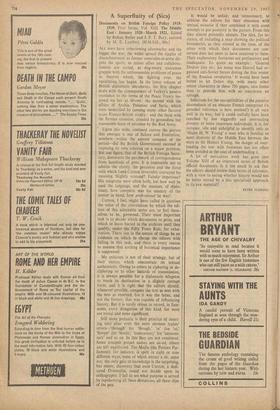A Superfluity of (Sics)
Documents on British Foreign Policy 1919- 1939. First Series, Vol. XIII. The Middle East : January 1920 - March 1921. Edited by Rohan Butler and J. P. T. Bury, assisted by M. E. Lambert. (H.M.S.O., 80s.) ALL wars have unbecoming aftermaths; and the bigger the war, the wider spread the ripples of disenchantment as former comrades-in-arms dis- pute the spoils, as minor allies and collabora- tionists are carted, as dog-weary statesmen grapple with the unforeseeable problems of peace in theatres where, the fighting over, the squabbling has begun. In the latest volume of British diplomatic documents, the first chapter deals with the consequences of Turkey's passive resistance to the terms of the Peace Treaty im- posed on her at Sevres: the second with the affairs of Arabia, Palestine and Syria, which were bedevilled by (among many other factors) acute Franco-British rivalry: and the third with the Persian situation, clouded by groundless but reasonable fears of invasion by the Red Army.
Upon this wide, confused canvas the picture that emerges is one of failure and frustration; nowhere--within the narrow compass of the period—did the British Government succeed in imposing its own solution on a major problem. But one figure, that of the British Foreign Secre- tary, dominates the patchwork of correspondence from hundreds of pens. It is impossible not to admire the clarity, the precision and the force with which Lord Curzon invariably conveyed his meaning. Slightly orotund? Faintly imperious? His telegrams were often both; but how well he used the language, and the nuances, of diplo- macy, how complete was his mastery of the matter in hand, how professional he was!
Curzon, I feel, might have called in question the value of the conventions by which the edi- tors of this admirable series arc, or feel them- selves to be, governed. Their most important task is to decide which documents to print, and which to leave buried in the archives until they qualify, under the Fifty Years Rule, for exhu- mation. There can in the nature of things be no evidence on which to charge the editors with failing in this task, and there is every reason to assume that nothing of historical importance is suppressed.
My criticism is not of their strategy, but of their tactics, which concentrate on textual authenticity. Owing to errors in ciphering or de- ciphering or to other hazards of transmission, it is always possible for a diplomatic telegram to 'reach its destination in a slightly corrupt form; and it is right that the editors should, whenever possible, compare the text as sent with the text as received, for it was the latter, and not the former, that was capable of influencing history. But it is surely otiose to record, in foot- notes, every divagation of this kind, for most are trivial and none significant.
Still more pedantic is their practice of insert- ing (sic) after even the most obvious typists' errors--`through' for `though,' or for 'or,' `Sovyee for `Soviet,' unnecesasry' for 'unneces- sary' and so on. In this they are not consistent. Some misspelt proper names are sic-ed, others arc left unpilloried. The Majlis (the Persian Par- liament), for instance, is spelt in eight or nine different ways, some of which attract a sic, some not; the only gain to knowledge is the surprising, but minor, discovery that even Curzon, a dedi- cated Orientalist, could not decide upon its orthography. I fail to see what purpose is served by lapidarising all these deviations, all these slips of the pen. It would be unfair, and unnecessary, to criticise the editors for their obsession with textual minuthe if they combined it with some attempt to put posterity in the picture. From this they almost pointedly abstain. The idea, for in- stance, of including a map showing the political boundaries, as they existed at the time, of the areas with which their documents are con- cerned does not seem to have occurred to them. Their explanatory footnotes are perfunctory and inadequate. To quote an example: 'General Doutov [my sic: his name was Dutov] had or- ganised anti-Soviet forces during the first winter of the Russian revolution.' It would .have been better to let Dutov slip, with many other minor characters in these 750 pages, into limbo than to provide him with so inaccurate an epitaph.
Solicitude for the susceptibilities of the putative descendants of an obscure French interpreter Ca personal reference is here omitted') is all very well in its way; but' it could usefully have been matched by less niggardly and unrevealing dossiers of more important individuals. It is, for instance, idle and unhelpful to identify only as 'Major H. W. Young' a man who is familiar to most students of the Middle East between the wars as Sir Hubert Young; the danger of over- loading the text with footnotes has too often been avoided at the cost of underloading it.
A lot of meticulous work has gone into Volume XIII of an important series of British official documents. Is it too much to ask that the editors should review their terms of reference, with a view to seeing whether history would not be better served by a less specialised approach to its raw material?
PETER FLEMING






























































 Previous page
Previous page